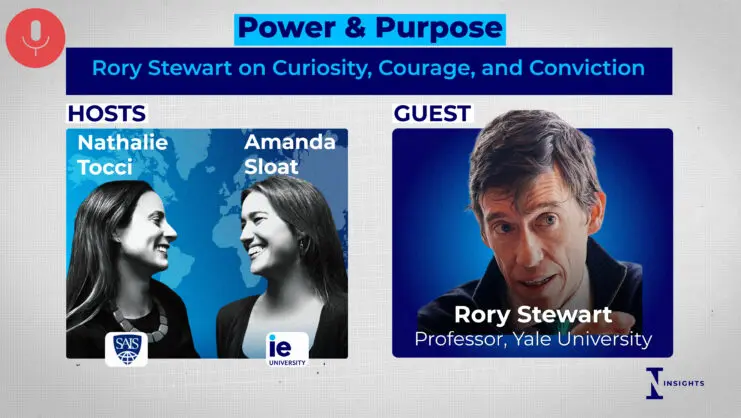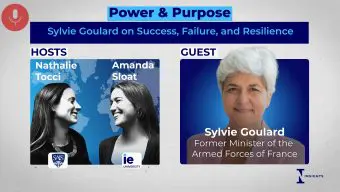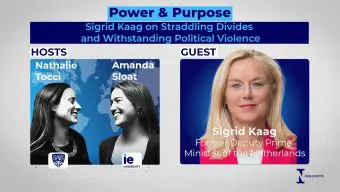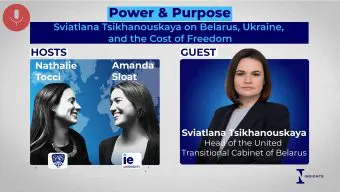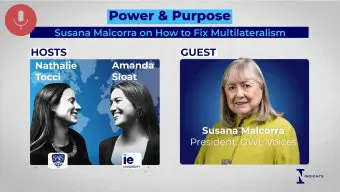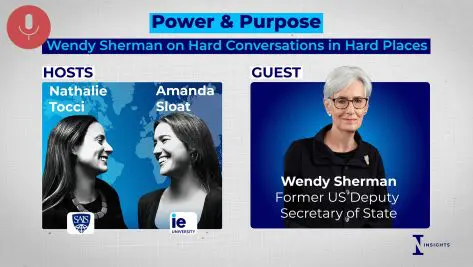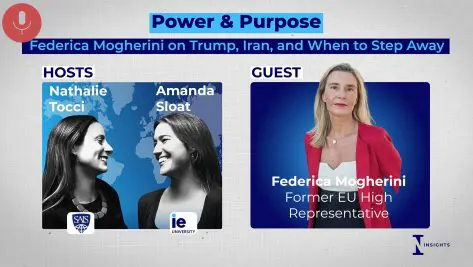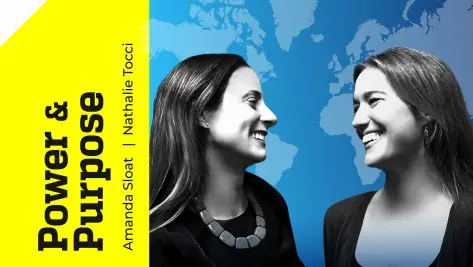Bridget Brink on Leading in a War Zone & the Importance of Diplomacy
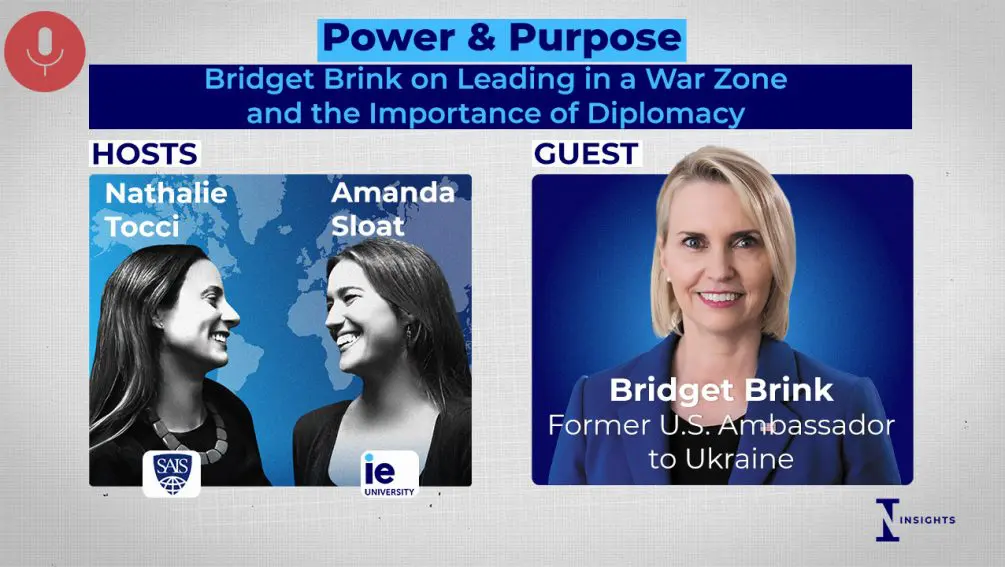
Drawing on nearly three decades in diplomacy, former U.S. Ambassador to Ukraine Bridget Brink joins Amanda and Nathalie to reflect on principle, resilience, and hope in the pursuit of peace and the protection of democracy. She recounts running to bomb shelters during her years in Kyiv, her decision to resign in protest of U.S. policy, and what it means to lead through crisis. From navigating life in a war zone to running for Congress, Bridget shares candid insights on the power of perseverance.
© IE Insights.
Transcription
Amanda Sloat
Welcome to Power and Purpose. Nathalie and I are excited to welcome Bridget Brink, my friend and former colleague, who had a nearly 30-year-career as an American diplomat. She dedicated her career to European affairs, working as ambassador to Ukraine and Slovakia, as well as serving in Uzbekistan, Georgia, Serbia and various roles in Washington. Earlier this year, Bridget resigned as ambassador to Ukraine because she opposed the Trump administration’s policy of pressuring Ukraine while giving Russia a free pass.
Two months later, she announced her candidacy for the US House of Representatives to represent a constituency in the central part of Michigan, which is, among other things, home to my alma mater, Michigan State University. Bridget, welcome to the show.
Bridget Brink
Hi, Amanda. Thanks so much for having me.
Amanda Sloat
So you and I worked together in the Biden administration on Ukraine. You arrived in Kyiv in May 2022, just months after the war started that February. And personally, I was so thankful to have you there, not only because you were a friend and colleague that I enjoyed working with, but also because we’d been without an ambassador for three years.
Your first task, of course, was reopening the embassy, as U.S. staff had been withdrawn in the early weeks of the war. You, as I said in the introduction, had a tenure that continued into the Trump administration. And then you very publicly resigned in disagreement with his approach. So I would be interested in starting with a conversation on Ukraine, sharing with our listeners where you see things going.
Trump has been all over the place in recent months, although he at least seems to recognize Putin doesn’t want the war to end, and seems to recognize that Europeans will continue to support Kyiv. So I’m curious how you see the situation evolving. Are you worried there’s still a risk that Trump may side with Putin and try and force Zelensky to give up territory?
And if you were still there, what advice would you be giving on how to end the war?
Bridget Brink
Well, thanks. That’s the $60 million question. I mean, essentially, I think we’re now eight, nine months into the administration, and it’s very clear. I think Putin bottom line is stringing our president and our government along. I don’t see a big change from when I resigned in opposition to the policy. I think that the only thing that Putin understands is strength.
And the only way to end this war, which I think is the right goal, is to show a coordinated effort of strength together with partners and allies. And it’s really simple. It just means putting major sanctions in place, increasing them and doing it in a way that ensures we can cut off the funding for Putin’s war machine. And second, getting the $300 billion in Russian sovereign assets in Europe and using that money to buy American weapons and other weapons so Ukraine can defend itself.
This would be a win all around. And the reason this is so important is that a win for Putin is a huge loss for Europe and a huge loss for the United States. And Putin believes that he’s winning. He is pretending to want to negotiate while he is changing facts on the ground. And he continues to do that to this day. What does that mean for us? Well, it means a Europe that is more at risk. That’s facing the biggest security challenge since World War Two, number one. But it also sends a signal to other adversaries and competitors around the world, like China. So the stakes for this particular conflict are extraordinarily high. And that’s why, when I was our Ambassador to Ukraine, I was really proud to be the leader on the ground of the U.S. effort, together with you back in Washington and, of course, the whole administration and our president, to do everything in our power and to use all the levers of American power to help keep a country of 40 million people in the middle of Europe free and independent. And I think this is a national security interest of the United States. And without a strategy to do it and using this shoot-from-the-hip approach, which is focused more on appeasing Putin than stopping him, we are not going to achieve our national interests.
Nathalie Tocci
Bridget, following up on what you just said. Do you think that when it comes to an American audience, does that national security argument resonate? Is there a sense on the other side of the Atlantic “well, Russia’s nasty, but we don’t really have a dog in that fight”. It’s really is a European problem. Do you find that your message on this actually still holds sway amongst the public?
Bridget Brink
Yes. Well, first of all, I do think Americans care about freedom. They care about freedom at home, and they care about it and understand why it’s important around the world. And why we have spent decades with bipartisan policy that supported freedom and democracy around the world. This is Republican administrations, Democratic administrations. So I would push back against anyone who says people don’t care about Ukraine.
That’s not the experience that I find living as an American or even in my district. Is it the number one issue? I don’t think it is the number one issue, but it is an issue, among other issues that people do care about. And many people, even though my focus in the district is on issues largely closer to home, that people vote on issues that largely affect their pocketbooks.
I always get questions on Ukraine. I can’t avoid it. And people want the United States also to be the leader of the free world and to be the country on the vanguard. They understand that if we’re not leading other countries and other adversaries are stepping in. So I believe that this remains a very important issue for our country and the people of the United States.
When I decided to resign. People have Ukrainian flags. I have people come to a lot of the things that I do with Ukrainian pins. There are a lot of Ukrainian-heritage folks in America and including in Michigan and in my district. But I think the reason that I resigned was not just because of the issue with regard to our policy.
There’ve been many times in my career where I felt that I didn’t agree with the policy. That’s normal. It didn’t cause me to think to resign. But the reason I resigned is I think the issue is so much bigger, it’s with our country and with our democracy. It’s not just that I oppose the specific policy on Ukraine, but it’s that I believe that our president is actually undermining the fundamental, the foundations of our democracy and our country in a way that is going to hurt us for generations to come.
And I believed that I needed to do something and to use my experience and my skills to try to make sure that we are the country that I was proud to represent every single day under multiple administrations. Rain or shine. To be the person and the face of the United States of America. And I think that’s who we are.
And maybe coming from the Midwest. And that’s why I chose to come home. And I came back home, came to Mid-Michigan with my family and decided to run for office. What I had as a young person from small-town Michigan was the ability to pursue my dream. And my dream took me to advise five presidents to work around the world, mostly in conflict zones and to have a career where I was the leader of our American effort on the ground to try to help save a country.
I think that’s really an American dream, and I think that’s what I want to see for every single kid. Every single person in our country. And that’s what makes us strong. I want that for all of us. And I think that’s what others want, too. We want to know that our kids can have an opportunity and a future that’s as bright as we had.
Or brighter, even better.
Nathalie Tocci
And, Bridget, if we think about Russia’s strategy, yes, it’s a military strategy when it comes to Ukraine. It’s a hybrid strategy when it comes to Ukraine and many other countries. And it’s a hybrid/political strategy in the sense of supporting illiberal, undemocratic, far right, populist, however you want to frame it, forces either in countries that it wants to control politically or in countries that it doesn’t necessarily want to control politically, but it certainly does not want those countries to support those that it wants to control politically right. Now, in a sense, one can say, the military part of that strategy has not exactly been a spectacular success.
Here we are almost four years into this war. Russia has not been able to even completely occupy the Donbas. The hybrid strategy is somewhat more effective, and we see how that is kind of deepening and kind of stretching out in different countries. But where actually there’s been win after win after win is on the political front. You basically see in all the countries that you’ve worked in that Russia has already quote unquote pocketed.
And we see the far right growing in other West European, South European countries, which, again, don’t necessarily then fit into Russia’s sphere of influence. And then, of course, there’s the United States itself, and the Trump-Putin relationship. So I’m just wondering if you could also speak a little bit about how this democracy piece basically fits into the broader international security problem that we’re talking about?
Bridget Brink
I think you’re exactly right. I think this effort by Putin is much broader than just to try to capture control Ukraine, although that’s clearly a goal. I think it’s much bigger than that. And I think this is really about the battle between democracy and autocracy. And it’s not even really a political battle. It’s about what does it mean?
What is the stronger mode of government: is it democracies? Is it autocracies? And what I can say is that what I have seen over the course of my career, over almost 30 years, and mostly countries that are new and young democracies, are some patterns that reflect the challenge of democracies, especially young democracies coming out of communism.
And these patterns are: they’re single-party leadership. They are use of security services, in ways that are seen as undemocratic. They are pressure on political opponents, a lack of an independent judiciary, a weak Parliament or Congress, an inability for people to express themselves in part because of self-censorship, but largely because of fear, because they may be arrested or prosecuted.
This is what I saw in my career all over parts of eastern Europe, southern Europe, in young democracies. But you could say the same thing about America right now. And that to me is terrifying. And that to me is a call to stand up and take action. And I think this is happening slowly, but it is happening in our own country, and people are being desensitized to things like having the National Guard in our cities.
Really, that’s quite something we haven’t seen certainly in my lifetime. Or having pressure from an administration on universities, on businesses, on law firms, on individuals directly coming from the president of the United States. I have to say this is alarming, and I think people are starting to realize it, and especially as it starts to hit issues at home. Again, until it hits people’s pocketbooks, until they see and feel it,
it may be that we don’t fully see or understand what’s happening. But a consequence of all this is that there is no strategic policy, whether it’s foreign or domestic. The policies that are being put in place are being done in a way which very much appears personal. And you can look at just what’s happening with Canada and the tariffs.
But I know from my own experience overseas that the way these cuts are happening is completely arbitrary. For example, I led the biggest USAID mission in the world, in Ukraine. And when President Trump came out and said he was going to significantly reduce and eliminate USAID, we immediately shot back with a recommendation to cut the AID program by 30% along a strategic line, which would help to end the war. Because to just take aid out completely would mean you leave a vacuum and others will come in and benefit from all the investment we’ve made to date.
And also you leave many people at risk. Many of our partners that we’re working with us, many American businesses, because a lot of USAID works with American business and so many American businesses were also immediately losing their contracts that had already been signed. That was completely ignored. And instead, the decision was to go forward and eliminate the entirety of the program, leaving a very small residual amount, not in our interests, not helping us achieve our goals.
This is exactly the same thing that’s happening at home; whether it’s Veterans Affairs, Social Security Administration, Health and Human Services, things are just being slashed and burned and cut to the ground. That’s not the way to be strategic or smart about giving benefits to our people and our citizens.
Amanda Sloat
I want to ask you the same question Nathalie asked me on the first episode. Like me, you attended high school in Grand Rapids. Like me, I know you also benefited from the life-changing experience of study abroad. How does a girl from Grand Rapids, Michigan end up having this career in foreign policy? You’ve been speaking with students at Michigan State.
Nathalie and I are both speaking with students here. For girls especially like you and me growing up in places like Michigan. What’s the path? What do you tell them?
Bridget Brink
Yeah, this is a great question. I love talking about this because it goes to the heart of what I’m doing now as well. And maybe I have to go back a little farther, but my family and my family’s American dream actually started in the greater Lansing area. And six generations ago, my family came from England and settled here,
actually the district I’m in now. And as farmers and for many generations they were farmers. But my grandfather became an auto worker and he worked in the auto plant that actually is basically right across from where I live now. And he went to high school also nearby where I am now. And then he met my grandmother in Lansing, and they met in an ice cream shop, and they had a single daughter and my mother she was born here in Lansing, and she actually also went to Michigan State.
So she’s a proud Spartan as well. And she ended up being the first in my family to go to college. She had two daughters, my sister and me, and she raised us as a single mom. My mom was a teacher and it was not easy, but she was fantastic in the sense of she is very loving and had a very keen sense for the importance of education.
And so she raised us to really value education and we ended up living with my grandparents, her parents, to make ends meet. And I went to public high school and was able to get scholarships and grants to go to college. And I went to a small liberal arts college, Kenyon College in Ohio. And while I was in Ohio, I happened to, for reasons I cannot remember, walk in to the study abroad office.
And Kennedy College is really in the middle of very rural Ohio. So I always like to say my journey to becoming ambassador started in rural Ohio. And so I walked into the study abroad office and somehow just picked up some literature and thought, wow, I could study abroad and that sounds really cool. And so I found out I could use my grants and scholarships to study abroad.
And I went to London School of Economics. And I have to say, the first six months I found London like super hard because it’s of course one of the biggest cities in the world. And I found as someone coming from a small town, it was really difficult. But after six months and I was there for a year, something clicked.
So for me it really like it was the thing that probably changed my life more than anything else, because not only was I exposed to just the course book, like what you could choose. And it was like 400 pages of what you could choose to study. And, you know, it just kind of opened my world in a way probably nothing else ever has since then, and in a great way.
And plus LSE is in downtown, City of London. And so I also was exposed to theater and music and art and culture and all the museums. And London is actually a really great place, probably a lot of Europe you could say the same, for students. It’s very welcoming to students. So you could go and do all these things, for a fraction of what it would cost if you were coming later in life or as an adult.
So anyway, that was just such a wonderful experience to me. I decided after I graduated from college to go back and go to graduate school, and then I went back to LSE because I kind of had been hooked by then. And I went and I studied political theory as a graduate student and got a graduate degree in that, and then also did international relations.
And after doing international relations, I realized I wanted to kind of combine my interest in political science and political theory, forms of government with international affairs. And that led me to wanting to join the Foreign Service. And so a few years later, the process when I joined was very long. And also, this is the 90s, and we had government shutdowns.
There were rifts. I mean, this was a time where it was actually quite difficult to get a job out of college. So when I joined the Foreign Service in 1996, it was really great because that was really the only option for me. It was the one I wanted the most, but it was unclear whether it was going to happen before I joined.
I remember getting a call saying, well, you sit on this list until you’re called up. And whoever was my contacts said, “we’re riffing a whole bunch of people from the State Department, you should just pursue other options”. And I was so crushed, I thought, oh, that’s terrible news. But I accepted it, and I was going to go and do something else.
And then I got a call and they said, hey, you can come and join our class in 1996. And that’s what I did. So that year, actually, they only took in maybe the smallest number within a ten year period because they were taking so few people. And so we all felt so lucky to be in.
And the people in my class, many of whom I think Amanda also knows, are all just really fantastic diplomats and people. And it’s one of the proudest moments of my life when I was able to be there and swear to defend and protect our Constitution. And that led me to a 28-year career, which really, literally every day I would wake up thinking, what can I do today?
It was a very positive experience of service, of service to our country, a belief in our values, and very apolitical, my job was to give my best advice and my best foreign policy advice. And so that’s kind of what brought me this opportunity. And the reason when I left and really probably I would never have dreamed that I would leave and resign.
That’s not something I would do normally or think that I would do. But I left because what I saw is everything that I had worked so hard for, that I had given my whole of my professional life the only thing I can give, really, to my country is being threatened and is at risk.
And I thought, I can’t go on and I have to find another way to help get us back to who we are, because it’s so important and help every kid have this kind of opportunity. And so this is how I ended up back in Mid-Michigan.
Nathalie Tocci
Can we get a little bit of a kind of behind-the-scenes Bridget, and thinking about our listeners, many of whom are young folks, hopefully, and many of them see these images of these amazing people, and they all have these kind of perfect careers, and they jump from one amazing thing to the next amazing thing, and they don’t get enough of a sense of the kind of personal travails and traumas behind many of these choices.
And I think it’s really important to share that part of the story, so as to not give the impression to people that it all has to be so absolutely perfect.
Bridget Brink
Yeah. That’s an excellent point. And whenever I talk especially to young people and, my kids really hate it when I focus on this, but I always say, you’ve got to embrace and welcome failure because no successful person is successful without a lot of failure. And their key to success is that they both learn from that failure, and they continue and they forage on
And so, of course, there are a lot of failed attempts along the way. You can’t have success without it. The fact is, you just have to. The best people really do learn from it, and that’s often hard to do. I was twice number two in our embassies, number two is really the hardest job in an embassy.
I loved being ambassador. I was ambassador twice. But being ambassador I wouldn’t say it’s an easy job, but the reason number two is hard is because you have to keep all the trains running on time. You have to carry out the instructions of the ambassador. You have to do the things that really the ambassador doesn’t want to do or doesn’t need to do because the person has a number two.
And so you really hear, you’re closer to the staff, you hear all their issues, and you have to be the one even giving the hard news when you know all the details. So, I did that twice. And I remember I had a really good head of my General Services Office. This is the office that basically provides all of the assistance and support to an embassy.
So when you serve overseas, you are given some kind of housing. And then the embassy helps support that housing. That means there are a lot of problems that can happen, and you have to work with the embassy to make sure your housing works for you or other types of issues. The motor pool that helps with drivers and transportation and many other aspects of your life that aren’t necessarily the policy aspects.
So GSO is a really key part – we call the General Services Officer GSO – a really key part of an embassy. If your GSO office is working well, your embassy is running well. My GSO every year they do a survey. Anybody who responds, usually it’s because there’s a problem. You really don’t get a lot of responses to say everything’s going great.
And I remember getting one of these hundred pages long feedback. And I remember seeing some of the comments and thinking, oh man, this really stings. And my GSO, he said “Bridget I think feedback is a gift because they’re giving you something, an insight that you might not have, and this is how it’s going to help us”.
And he was very earnest about it. And I said, “oh my goodness, okay, I’ll think of it that way”. But I really thought about that for the rest of my career, because I think that helped me take the feedback in a way that wasn’t personalized but was like, this is actually helping me be better. I also think there’s a specific challenge, and I know probably listeners are men and women, but I do think women, especially women in leadership positions, face a particular challenge.
And it’s a challenge of our society and culture and the way we’re raised, and the fact that some of the qualities that make for the great leader are not necessarily attributed to women right? To be decisive or assertive or a strong leader. I mean, in your mind, does that conjure up a man or a woman? And I think in a lot of cases, especially for women, and I didn’t really realize it at the time, but we’re still breaking through a lot of these barriers because they still exist.
It’s not only women that face these barriers, but I know it as a lived experience as a woman, that they still exist. And some people just have a really hard time seeing a woman as a leader and with these qualities. And this is one reason I was so proud to do the job I was asked to do by our president,
and our Secretary of state: to lead our mission in Ukraine, especially because for me it was a great honor. I was maybe ready-made job for my experience, background and perhaps personality, but also because I could lead as a woman and sort of set for the first woman leading in a war zone. We never had a female ambassador leading us in Afghanistan or in Iraq.
We were at war with those countries for decades. But what I felt is I could at least forge some ground for other people, other women and others behind me in a way that I think is really important. And also even beyond the male or female aspect, I believe strongly in our diplomacy. And diplomacy, some people believe this is people going to cocktail parties or having fun overseas.
You know, no, this is a profession, number one, it’s a learned profession that really is done through apprenticeship and from working with others and for others and watching how they do it. But number two, it’s a critical part of our arsenal to promote our values, to defend our interests, and to secure prosperity and security back home. This is something we need to use and we need to use it, I believe, aggressively, muscularly, proactively in a strategic sense, and we need to use it in combination with the other tools in our toolbox to effect and shape environments overseas.
That includes our assistance. This is a foreign policy tool to achieve our goals, but also the military. But diplomacy is the first line of defense. So for us in Ukraine, we went out and we did not have a military base on the ground. We did not work off a military platform. That platform was a diplomatic platform in a war zone with no self-defense on our own, using diplomacy led by a U.S. ambassador and having oversight and responsibility for the military that was there.
There are military advisers that advise the ambassador, but also assistance that helped millions of people and importantly other types of assistance that help do things like keep the lights on and the power on, and humanitarian assistance to help those that were displaced and prevent even more massive refugee flows into Europe. So to me, the success of that mission is really how we showed that diplomacy is a very important line of defense for the United States.
And we need to take that lesson and do that in other places as well. It’s much cheaper than military intervention.
Amanda Sloat
Bridget, you preempted one of the questions that I was going to ask you about women’s leadership and I really appreciate your reflections on that. One of the other themes that Nathalie and I talk a lot about in this podcast is wellness in these high stress jobs. And certainly for me, it was very stressful working around the clock on Ukraine from the White House.
But I was able to go home every night and there were not buildings blowing up around me. I was not responsible for the safety of staff. And so I’m interested just from a very personal level, you lived and worked in a war zone for three years. How did you stay healthy? How did you stay sane?
Bridget Brink
I would just say it was me and a team of almost a thousand others. So not me alone. But I did feel this responsibility to lead in a way that set the example, because I had started my career in the Balkans in the 90s, during the Balkan Wars. And at that time, we went through about eight months of very sustained stress and challenge of three evacuations.
We eventually closed our embassy. And then there was the NATO intervention in 1999, and I was actually the youngest person to go to the Rambouillet negotiations. And I was deeply involved in this but as a young person. At that time, and I remember this clearly, that I was asked, “what’s the secret to managing stress for this really long period of time?”
And I said simply, it’s really three things. One, you have to eat right, I think this is actually very important. Two, you’ve got to get good sleep, and three, you’ve got to exercise. And those three things basically is what carried me not just in Ukraine, but through my whole career. The challenge in Ukraine was really the sleep. And so having a good diet that’s not so hard to do.
Ukraine continued to have food on the in the stores and it was we were able to do that. Having exercise I’ve always prioritized that in my life. And it got harder. But I created an exercise place that I could do right at home. So that was something I could do or wherever I was. I lived in the hotel for a year and a half, and we lived in the embassy at first.
So I always found a way where it was nearby. The sleep was the hard one. And the reason why is that, and Amanda, you’ll remember this, that basically the hard thing about working overseas sometimes with the Ukrainians, we’re seven hours ahead of Washington, and then you work kind of another day or some part of the day with Washington. So very often, especially at the beginning of the war, we’d have these secure video calls and we’d have them at least a couple days a week at the highest levels.
And those would happen at eight or sometimes nine or sometimes even later at night, my time. And then I would go home, maybe get to sleep by midnight, because of course there’d be other work to do, and then by 2 or 3 we’d be up again because of air raid alerts. So almost every single night we had air raid alerts.
And for the first couple of years, I would wake up and I would direct my security. People would call me and they would see what was going on, and they would give me a recommendation. Do we go to bunker or not? Going to bunker means we get underground. You have to wake everybody up, bring them all underground, and a couple times we had some serious close calls, but we would have to do that almost every night.
For the first two years. I did that almost every night. So the sleep was always disturbed. After two years, I decided to just delegate that to my deputy, and I told my deputy, you have to just wake me up because I now need to get a good night’s sleep and I will wake up if you tell me I have to go, I’ll let you make that decision.
I felt confident that we had systems in place that would allow that, but the hardest thing is not getting sleep. I think that’s probably one of the harder things for the Ukrainians. And I can say that a lot of people now don’t listen to the air raid alerts, because you can’t just live your life working all day and then being up half the night, because you’ve got to decide whether to go to bunker or not.
That was the main challenge for me. So you got to keep your body healthy and I think everybody’s different, so they’re probably different. Some people would do meditation. Some people did yoga. We had a yoga class. You got to know yourself and you have to figure out what makes that machine of your body work in a situation of crisis and be very careful about things like alcohol.
And it doesn’t help. It doesn’t help with the sleep, and it doesn’t help certainly with the rest and recovery and certainly not drugs or other things. So I guess the simple things of a healthy, recommended lifestyle is what helped me get through it.
Amanda Sloat
No, absolutely. And we did our best with the meetings. It was definitely something I was conscious of scheduling a little bit harder with more senior people. Bridget, a lot of us are binge watching The Diplomat on Netflix. I don’t know if you have been watching it. I’m curious what you found realistic or not. I’m guessing you did not have a deputy who brought you clothes throughout the day.
Bridget Brink
No, I love that show. I think it’s excellent. I think it’s of course dramatized in certain ways and especially on some of those types of questions. No, you can’t mix your personal and the professional in that way. But I think there are a lot of very realistic aspects to it, I think it’s a great show. I think it’s probably the best show I’ve ever seen to replicate kind of the life that we know and the really heavy, hard questions that we have to face and what’s at stake in them.
And I think that’s very important to put out and I’m proud, I think it’s great. And I’ve loved it, I’ve watched all three seasons already.
Amanda Sloat
I just finished as well.
Nathalie Tocci
And Bridget, if I were to ask, what is the one kind of final piece of advice that you would actually want to leave our listeners with, particularly younger listeners?
Bridget Brink
I think the most important thing is: it’s never over. The thing about diplomacy and the thing about how I’ve spent my life is that it doesn’t end, you know, we’re always fighting for our interests and our values. I think the same is true in our country. You know, we’re always striving to create the more perfect union. So what I’d say is it’s never over.
So we have to we have to keep up this fight, and we have to keep it up and be persistent in it. And so I have a view of great optimism, of where we are as a country, in terms of where we can go, even in the midst of what I believe is the biggest crisis that we are facing in our lifetimes, I think that there’s a symptom of it, and that’s the kind of situation we face now.
And the way in which Donald Trump is leading the government. But I think the bigger crisis is people just feel like there’s no opportunity, our opportunity of the American dream is slipping away. And so what’s happening is they’re questioning the institutions and the government. And we’re seeing things that I’ve never seen before in my lifetime.
Amanda Sloat
Bridget, it’s been a real pleasure to have you with us today on the show, we like to end on a positive note. So my last question for you is what’s something that brought you joy in the last few days?
Bridget Brink
Well, that’s an easy one. It’s really my chance to talk to students last night, at 8 p.m. at night. I was at MSU, at your old stomping ground Amanda, and had a full house of young people who were very eager to hear, not only from me, but from other political candidates, and who were active and involved.
This is something that I wasn’t as a young person in this way, not politically active like this. And it really heartened me as to the future of our country because as I believe this is about the future, it’s really not about any of us. It’s about what comes after. And that’s what I think is important to remember and about those that are of the next generation who are going to come up and take power and how they do it.
And I want them to feel there’s a hopeful future and a future that’s going to give this opportunity to everyone. And I saw that last night. I saw that they asked really hard questions, which I always appreciate and welcome. And I think that to me, 8:00 on a Tuesday night, they could be doing a lot of other things.
Nathalie Tocci
Well, wonderful. Bridget this has been such a delightful conversation and my two word takeaway from it are probably: power and perseverance, which I think you, you really embody. So thank you so much for what you shared. I’m sure it’s going to be absolutely inspiring for so many of our listeners and we’re with you and best of luck for the weeks and months ahead.
Bridget Brink
It’s a privilege to be with you. Thanks a lot and all the best you both. Thanks for doing this.
Amanda Sloat
Thank you so much, Bridget.



